BACK TO RESEARCH WITH IMPACT: FNR HIGHLIGHTS
For each Lindau Nobel Laureate Meeting, the FNR runs a Call for promising young researchers with a connection to Luxembourg to attend. The 2024 Lindau Nobel Laureate Meeting was dedicated to physics. We spoke to theoretical physicist Pablo Martinez Ascona about his experience attending the meeting surrounded by physics Nobel Prize Winners and hundreds of young researchers.
You had the opportunity to hear from and meet Nobel Prize winners and hundreds of other young researchers, can you describe the overall experience?
“The Lindau Nobel Laureate Meeting has been one of the most extraordinary experiences of my life, both personally and professionally.”
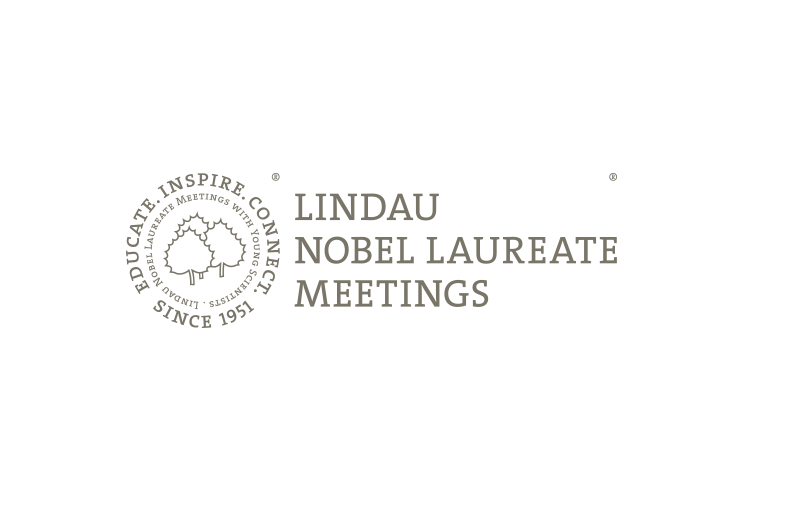
“It's difficult to fully capture how it felt, but let me try with an analogy: imagine meeting some of the most passionate fans of your favorite bands, and then spending time on an island with the bands themselves. The Nobel Laureates were like "rockstars", meeting with fans who may one day create their own masterpieces. There’s something truly special about the sense of community that this environment fosters among everyone involved. The laureates were eager to share their work, discuss their views on physics, and share their life experiences. At the same time, being surrounded by so many young scientists like myself provided the opportunity to exchange ideas and perspectives on what a future in physics might look like from our different perspectives. ”Pablo Martinez Ascona Theoretical Physicist & PhD student at the University of Luxembourg
What was your impression of the Nobel Prize winners?
“It was incredible to witness their joy and passion for science. They were also incredibly humble and approachable. At times, it felt like you were chatting with your grandfather about his life, with all their thoughts being profoundly insightful. At the same time, you realized they are just like any of us. It was fascinating to ask about their hobbies, personal lives, and see them having fun, or to hear the human stories behind their discoveries.”
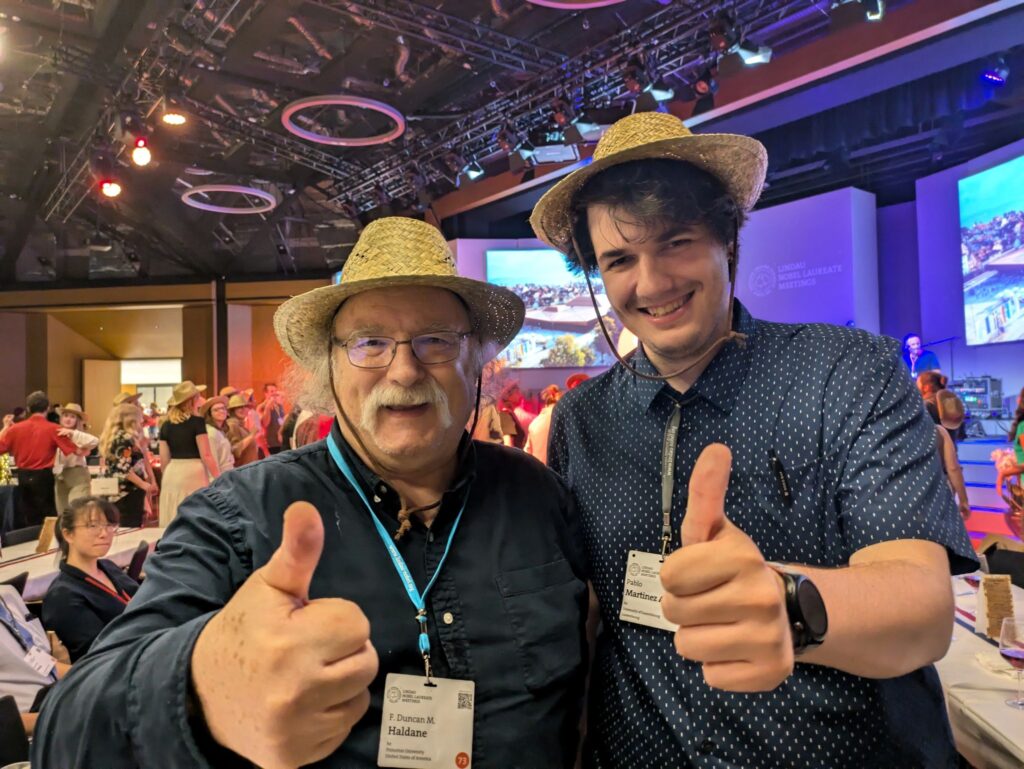
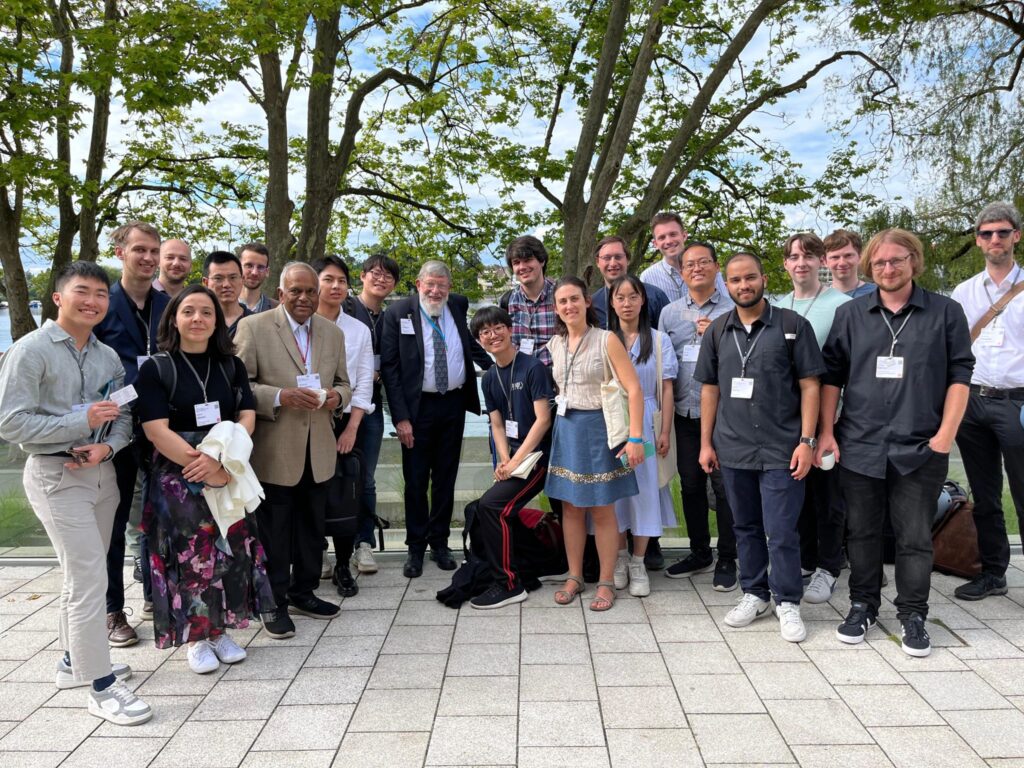
What were your highlights of the scientific programme?
“The entire scientific program was filled with fascinating talks and activities. Among the talks and discussions, I particularly enjoyed the Agora lectures by Bill Phillips and Klaus von Klitzing on the redefinition of the International System of units, as well as the presentation by Haroche and Wineland on controlling individual quantum systems. I was especially surprised by Dan Schechtman’s talk, “The Aesthetics and Science of Soap Bubbles”, which highlighted the intriguing science behind something as mundane, yet captivating, as a soap bubble.”
“Two especially interesting events were the panel discussions on “Quantum Computing Hype” and “Maintaining Society’s Trust in Science in the Age of AI”. I found the first discussion particularly engaging, as it directly relates to my field.”
“Quantum Computing and Artificial Intelligence were two prominent themes across many of the sessions. These topics are especially timely, given the recent groundbreaking developments in both fields. As physicists, it’s important for us to understand their potential applications in research and to consider how they will impact society as a whole.”
Can you tell us more about the “Quantum Hype” and the surrounding issues?
“We know there are quantum algorithms that outperform their classical counterparts—meaning some very difficult problems can potentially be solved faster using a computer based on the laws of quantum mechanics: a Quantum Computer. This has drawn significant attention to quantum science and technology, and the research is indeed promising. We are successfully building and controlling increasingly larger quantum systems. However, these systems are still far from being powerful enough to solve those problems faster than the best classical supercomputers.”

“Nevertheless, some companies, are making bold claims about soon achieving a highly powerful quantum computer. This is what we refer to as Quantum Hype. While these big promises have attracted substantial investment in the field, they also come with the responsibility to deliver on them. The risk is that if these promises go unfulfilled in the coming years, investment in quantum research could disappear, leaving many highly qualified scientists without jobs. ”Pablo Martinez Ascona Theoretical Physicist & PhD student at the University of Luxembourg
“The panel included two Nobel laureates, Serge Haroche and Bill Phillips, along with representatives from industry, grant agencies, and others. Haroche, in particular, argued for allowing quantum science to develop at its natural pace, without the pressure of making overhyped promises, and without the constant focus on producing “useful” results.”
“He pointed out that research once deemed useless, like Bell’s inequalities, has led to significant advancements, such as current quantum technologies. On the other hand, some industry representatives appreciated the big promises because they attracted more funding.”
“Personally, I found Haroche’s position insightful, as he seemed acutely aware of the negative consequences that a hype bubble bursting could have on the field, especially for young scientists with less experience.”
Did you find any inspiration at the meeting, for your work or outside?
“I found plenty of inspiration for shaping my future research and for how to approach science as a whole. Ultimately, most of the advice from the laureates was to follow your instincts and work on what you truly enjoy and find interesting. They emphasized never doing it for recognition, but rather for your own intellectual curiosity and pleasure.”
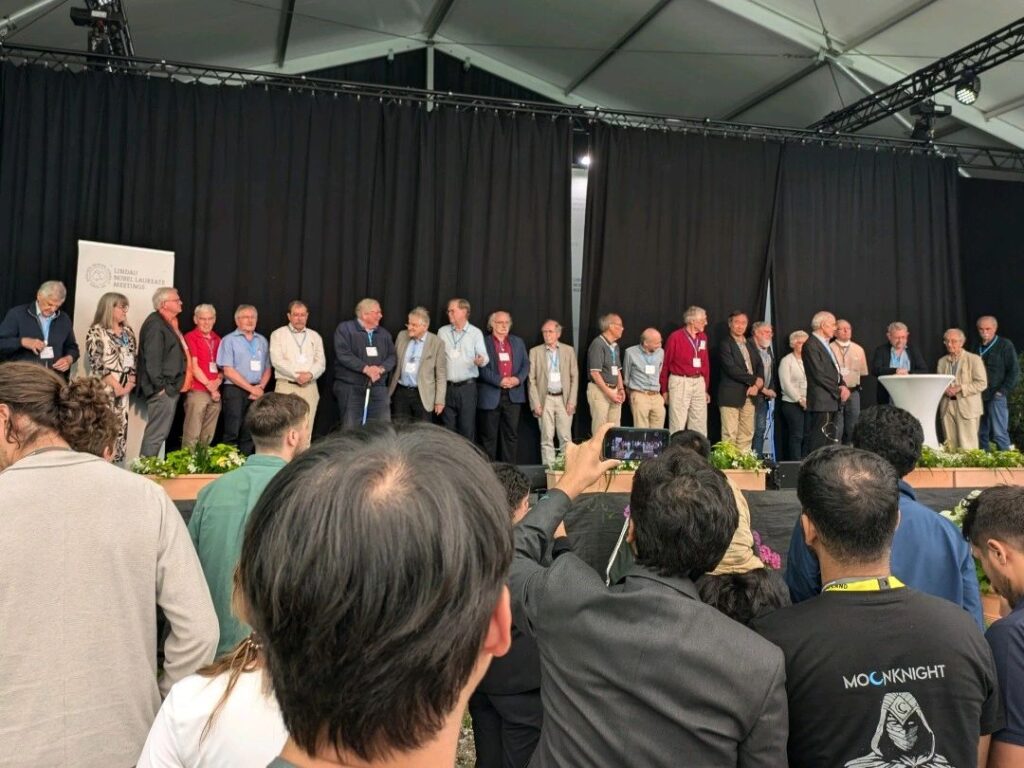
“On a more specific note, as a theoretical physicist, I noticed that most of the laureates were either experimentalists or had worked closely with experiments. This has motivated me to explore ways to collaborate more with experimental colleagues, as no matter how elegant our mathematical theories and results may be, they must ultimately be tested by nature through experiments. I also found inspiration on how to manage the balance between personal and academic life. ”Pablo Martinez Ascona Theoretical Physicist & PhD student at the University of Luxembourg
“This came from both laureates and young scientists alike. Through conversations about our life perspectives, shared experiences, and building connections with other young researchers, as well as listening to the laureates’ stories on overcoming life’s inevitable challenges, I gained valuable insights on how to handle these aspects.”
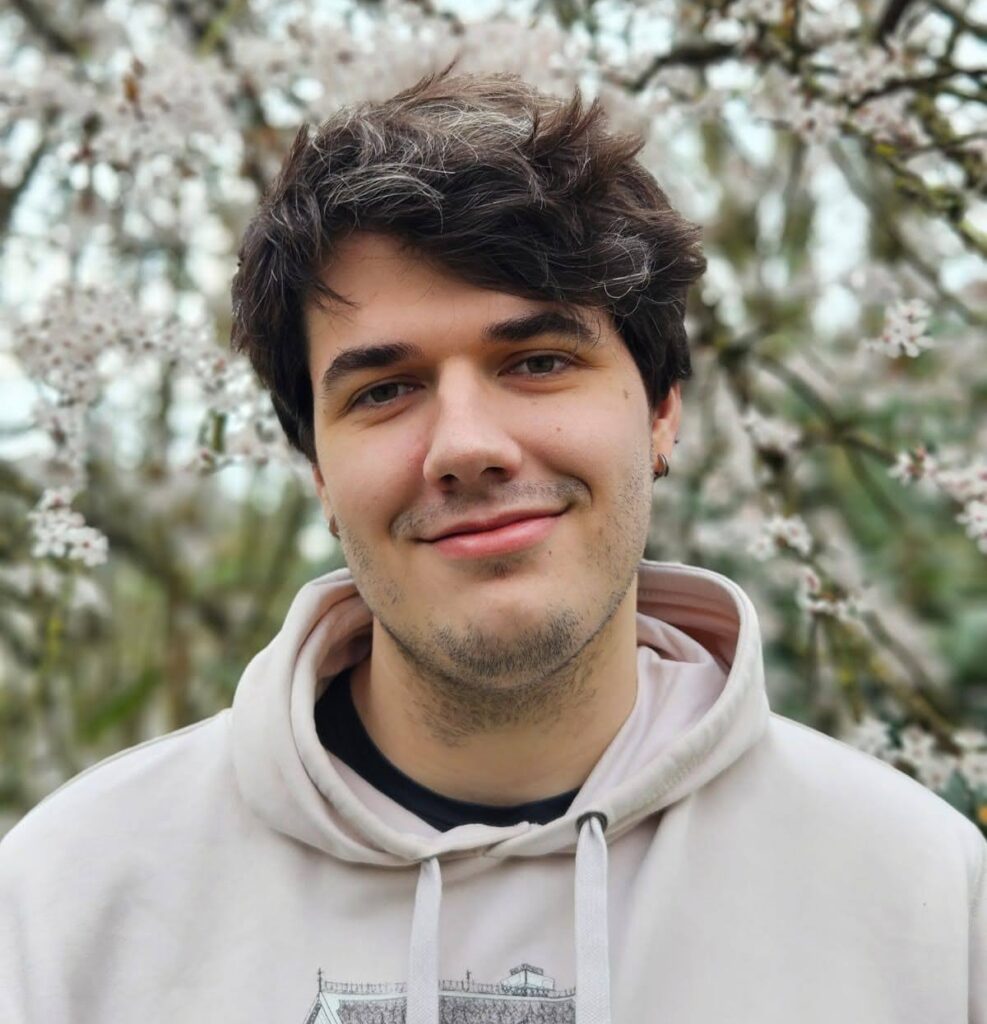
Can you tell us a bit about your research and why it is important?
“My research focuses on quantum chaos and open quantum systems. Open quantum systems explore how quantum systems interact with their environment, and through a process called decoherence, they explain how the classical world emerges and why it is so challenging to preserve certain quantum properties for extended periods.”
“Quantum chaos, on the other hand, addresses how the butterfly effect—extreme sensitivity to initial conditions—manifests in the quantum realm.”
“Specifically, I am interested in discovering new and exotic equations of motion that describe the dynamics of quantum systems interacting with their environment. I am also intrigued by how these equations of motion reveal properties related to the system’s chaotic behavior. ”Pablo Martinez Ascona Theoretical Physicist & PhD student at the University of Luxembourg
Related highlights
“After coming back to Luxembourg, to my quiet research corner, I realised the value of this intense week”
For each Lindau Nobel Laureate Meeting, the FNR runs a Call for promising young researchers with a connection to Luxembourg…
Read more
“Truly epic—a once-in-a-lifetime event”
For each Lindau Nobel Laureate Meeting, the FNR runs a Call for promising young researchers with a connection to Luxembourg…
Read more
2023 Lindau Meeting: “An extraordinary experience”
For each Lindau Nobel Laureate Meeting, the FNR runs a Call for promising young researchers with a connection to Luxembourg…
Read more
“Like a school summer camp, but with amazing young chemists and Nobel laureates”
For each Lindau Nobel Laureate Meeting, the FNR runs a Call for promising young researchers with a connection to Luxembourg…
Read more
“Hearing how different life decisions and habits can lead to very successful scientific careers”
For each Lindau Nobel Laureate Meeting, the FNR runs a Call for promising young researchers with a connection to Luxembourg…
Read more
“They are normal human beings like you and me”
For each Lindau Nobel Laureate Meeting, the FNR runs a Call for promising young researchers with a connection to Luxembourg…
Read more